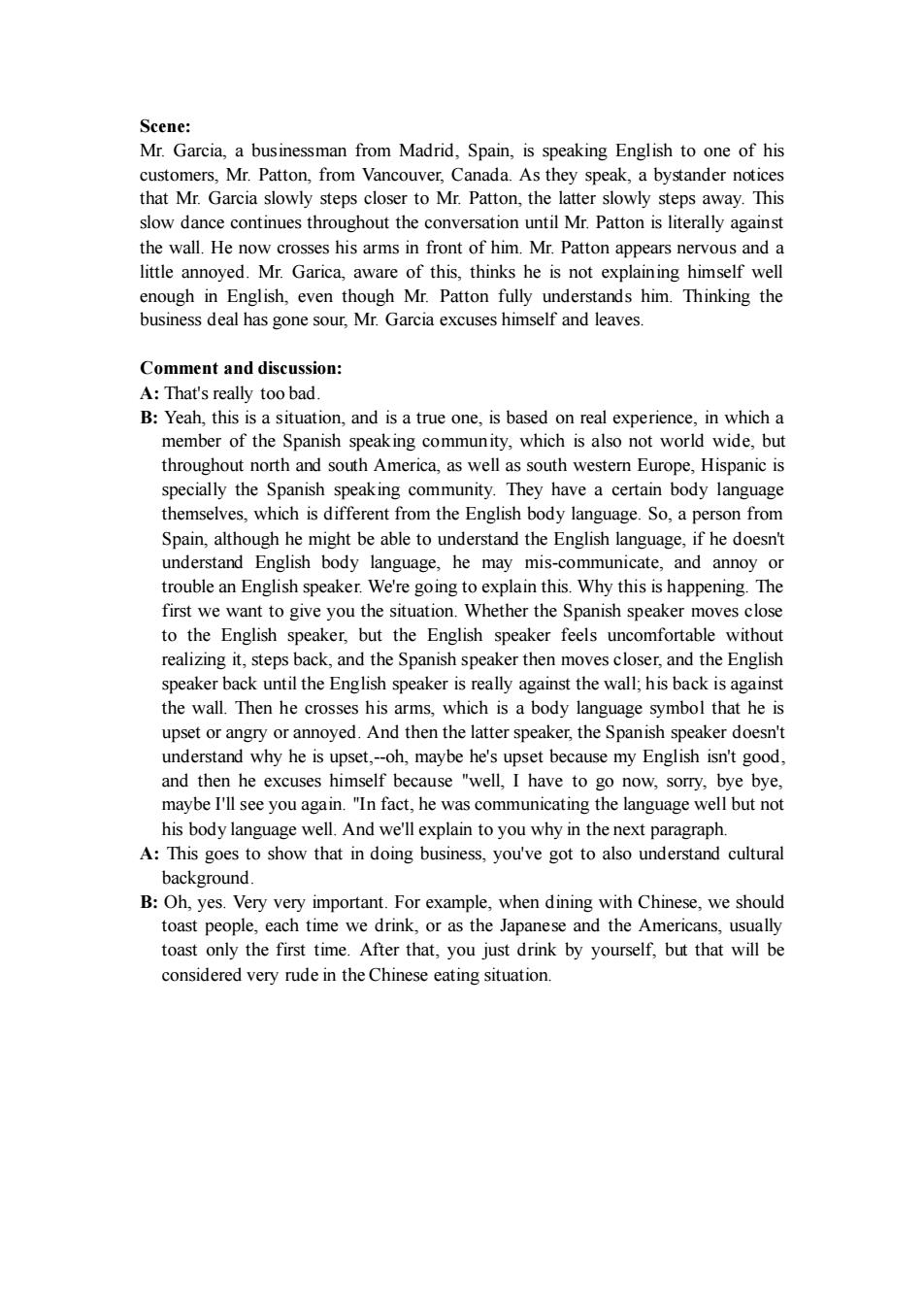正在加载图片...

Scene: Mr.Garcia,a businessman from Madrid,Spain,is speaking English to one of his customers,Mr.Patton,from Vancouver,Canada.As they speak,a bystander notices that Mr.Garcia slowly steps closer to Mr.Patton,the latter slowly steps away.This slow dance continues throughout the conversation until Mr.Patton is literally against the wall.He now crosses his arms in front of him.Mr.Patton appears nervous and a little annoyed.Mr.Garica,aware of this,thinks he is not explaining himself well enough in English,even though Mr.Patton fully understands him.Thinking the business deal has gone sour,Mr.Garcia excuses himself and leaves. Comment and discussion: A:That's really too bad. B:Yeah,this is a situation,and is a true one,is based on real experience,in which a member of the Spanish speaking community,which is also not world wide,but throughout north and south America,as well as south western Europe,Hispanic is specially the Spanish speaking community.They have a certain body language themselves,which is different from the English body language.So,a person from Spain,although he might be able to understand the English language,if he doesn't understand English body language,he may mis-communicate,and annoy or trouble an English speaker.We're going to explain this.Why this is happening.The first we want to give you the situation.Whether the Spanish speaker moves close to the English speaker,but the English speaker feels uncomfortable without realizing it,steps back,and the Spanish speaker then moves closer,and the English speaker back until the English speaker is really against the wall;his back is against the wall.Then he crosses his arms,which is a body language symbol that he is upset or angry or annoyed.And then the latter speaker,the Spanish speaker doesn't understand why he is upset,--oh,maybe he's upset because my English isn't good, and then he excuses himself because "well,I have to go now,sorry,bye bye, maybe I'll see you again."In fact,he was communicating the language well but not his body language well.And we'll explain to you why in the next paragraph. A:This goes to show that in doing business,you've got to also understand cultural background. B:Oh,yes.Very very important.For example,when dining with Chinese,we should toast people,each time we drink,or as the Japanese and the Americans,usually toast only the first time.After that,you just drink by yourself,but that will be considered very rude in the Chinese eating situation.Scene: Mr. Garcia, a businessman from Madrid, Spain, is speaking English to one of his customers, Mr. Patton, from Vancouver, Canada. As they speak, a bystander notices that Mr. Garcia slowly steps closer to Mr. Patton, the latter slowly steps away. This slow dance continues throughout the conversation until Mr. Patton is literally against the wall. He now crosses his arms in front of him. Mr. Patton appears nervous and a little annoyed. Mr. Garica, aware of this, thinks he is not explaining himself well enough in English, even though Mr. Patton fully understands him. Thinking the business deal has gone sour, Mr. Garcia excuses himself and leaves. Comment and discussion: A: That's really too bad. B: Yeah, this is a situation, and is a true one, is based on real experience, in which a member of the Spanish speaking community, which is also not world wide, but throughout north and south America, as well as south western Europe, Hispanic is specially the Spanish speaking community. They have a certain body language themselves, which is different from the English body language. So, a person from Spain, although he might be able to understand the English language, if he doesn't understand English body language, he may mis-communicate, and annoy or trouble an English speaker. We're going to explain this. Why this is happening. The first we want to give you the situation. Whether the Spanish speaker moves close to the English speaker, but the English speaker feels uncomfortable without realizing it, steps back, and the Spanish speaker then moves closer, and the English speaker back until the English speaker is really against the wall; his back is against the wall. Then he crosses his arms, which is a body language symbol that he is upset or angry or annoyed. And then the latter speaker, the Spanish speaker doesn't understand why he is upset,--oh, maybe he's upset because my English isn't good, and then he excuses himself because "well, I have to go now, sorry, bye bye, maybe I'll see you again. "In fact, he was communicating the language well but not his body language well. And we'll explain to you why in the next paragraph. A: This goes to show that in doing business, you've got to also understand cultural background. B: Oh, yes. Very very important. For example, when dining with Chinese, we should toast people, each time we drink, or as the Japanese and the Americans, usually toast only the first time. After that, you just drink by yourself, but that will be considered very rude in the Chinese eating situation